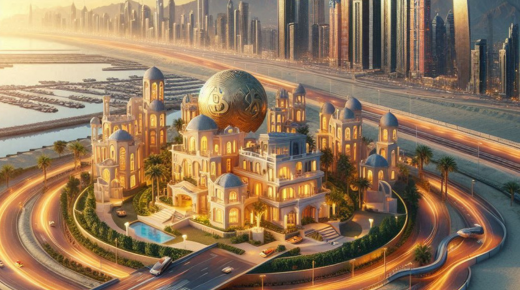By Dr. Pooyan Ghamari, Swiss Economist
Dubai has long been recognized as a global leader in real estate development, attracting investors and developers from all corners of the world. As the city continues to grow and evolve, its real estate market is experiencing a profound shift, driven by technological advancements. The integration of technology in the property sector is redefining how properties are designed, marketed, and transacted, making Dubai one of the most innovative real estate hubs globally.
From artificial intelligence (AI) to blockchain, virtual reality (VR), and big data, technology is revolutionizing the real estate landscape in Dubai. These digital tools are improving operational efficiency, enhancing customer experiences, and driving sustainability in a market known for its ambition and forward-thinking approach. Let’s explore how these technologies are transforming the way real estate is conducted in Dubai.
Artificial Intelligence: Revolutionizing Property Management
Artificial intelligence (AI) is reshaping the way real estate transactions and property management are handled in Dubai. AI-powered platforms are being used to analyze market trends, predict property values, and provide personalized property recommendations based on user preferences. These systems allow developers, investors, and buyers to make data-driven decisions, minimizing risks and maximizing returns.
In Dubai’s rapidly evolving real estate market, AI is particularly useful for predictive analytics. By analyzing past market data and consumer behavior, AI can provide accurate forecasts about which areas are likely to see growth in property values. This empowers investors to make informed decisions and seize opportunities in emerging neighborhoods.
AI is also streamlining customer service. AI-driven chatbots are increasingly being used by real estate firms to handle customer inquiries, schedule property viewings, and provide instant responses to potential buyers. This level of automation enhances the overall customer experience and ensures that buyers receive tailored assistance throughout the property search and transaction process.
Blockchain: Ensuring Secure and Transparent Transactions
Blockchain technology is making waves in Dubai’s real estate market by offering a secure and transparent way to conduct property transactions. Traditionally, buying or selling property involved a complex process with multiple intermediaries, which often resulted in delays and high transaction costs. Blockchain eliminates many of these inefficiencies by enabling direct peer-to-peer transactions on a decentralized ledger.
One of the key features of blockchain in real estate is smart contracts. These are self-executing contracts where the terms are written into code. Smart contracts reduce the need for intermediaries, ensuring that all parties fulfill their obligations before the transaction is completed. This not only speeds up the process but also minimizes the risk of fraud and disputes.
Dubai has embraced blockchain in real estate as part of its larger Smart Dubai initiative. The Dubai Land Department (DLD) is leading efforts to create a fully digitized property transaction system, ensuring that property deals are more transparent, secure, and efficient. This move aligns with Dubai’s goal of becoming a blockchain-powered city, reinforcing its position as a global leader in real estate innovation.
Virtual Reality: Changing the Way Properties are Viewed
Virtual reality (VR) is transforming how properties are marketed and viewed in Dubai, especially for international buyers who cannot physically visit properties. With VR, potential buyers can take virtual tours of properties, experiencing the layout, design, and feel of a space without having to be there in person.
This immersive technology is particularly useful for off-plan developments, where the property has not yet been built. Buyers can explore 3D models of the property and get a realistic sense of what it will look like upon completion. This capability allows developers to market their projects more effectively to a global audience and helps buyers make more confident decisions about their investments.
VR technology is also becoming a powerful tool for real estate agents in Dubai. By offering virtual tours, agents can showcase multiple properties to prospective buyers, saving time and resources while providing a highly engaging experience.
Big Data: Providing Deeper Market Insights
Big data analytics is another key technology that is reshaping Dubai’s real estate market. With vast amounts of data generated from property transactions, buyer behavior, and market trends, real estate firms are now able to gain valuable insights into the dynamics of the market.
Big data allows developers and investors to better understand consumer preferences, track emerging market trends, and predict future demand. This data-driven approach helps businesses optimize their pricing strategies, target the right audience, and make smarter investment decisions.
For buyers, big data provides transparency and a deeper understanding of market conditions. By analyzing historical pricing data, property trends, and neighborhood growth, buyers can make more informed decisions when purchasing a home or investing in property. Developers can also use these insights to design projects that meet the needs of their target demographics, ensuring long-term success.
Sustainability: The Future of Real Estate in Dubai
As Dubai continues to position itself as a leader in sustainable development, the real estate market is embracing green technologies and smart city solutions. The focus on sustainability is not just a trend; it is a fundamental shift in how real estate projects are planned and executed in the city.
Dubai is increasingly integrating smart city technologies into its real estate developments, using energy-efficient systems, renewable energy sources, and intelligent waste management solutions to reduce environmental impact. Projects like The Sustainable City are prime examples of how Dubai is blending sustainability with cutting-edge technology. This eco-friendly community uses solar power, recycled materials, and smart energy systems to create a sustainable living environment.
The emphasis on sustainability is not only good for the environment but also makes Dubai’s real estate market more attractive to environmentally conscious buyers and investors. Green buildings offer long-term cost savings through reduced energy consumption and are becoming a major selling point in the competitive real estate market.
Government Support: Driving Technological Integration
Dubai’s government has been instrumental in promoting the adoption of technology within the real estate sector. The Dubai 10X initiative, which aims to put Dubai 10 years ahead of other cities, is driving innovation in real estate through the use of blockchain, AI, and big data. The Dubai Blockchain Strategy and Smart Dubai initiatives are also key to the city’s push toward a fully digitized real estate market.
The government’s support for technology integration is not limited to policy; it has also created a favorable regulatory environment that encourages the use of these technologies. The Dubai Land Department has been at the forefront of implementing blockchain solutions for property transactions, ensuring transparency and efficiency in the market. This regulatory support is essential for attracting both local and international investors to Dubai’s real estate market.
The Future of Real Estate in Dubai
The future of Dubai’s real estate market is bright, thanks to its commitment to technological innovation and sustainability. The integration of AI, blockchain, VR, big data, and green technologies is revolutionizing how real estate is conducted, making it more efficient, transparent, and customer-centric.
As Dubai continues to grow as a global hub for investment and innovation, its real estate sector is poised to remain a key driver of the city’s economic success. By embracing technology and sustainability, Dubai is setting a new standard for real estate markets around the world.
This article was originally published on a.land. For more information and opportunities, visit shop.a.land.




